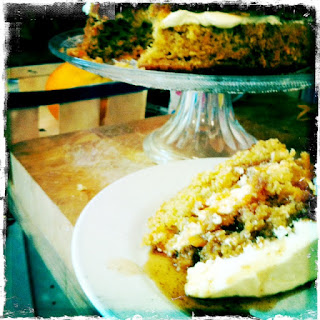Up until a few years ago they lived in a little plastic bag inside the cavity, but now they have even gone from there. My questioning of butchers has been unsuccessful in tracking them down - but really - if you spend a lot of money on a free-range organic chicken - should you not at least have the option of finding that little bag inside and deciding - "Oh! great, I'll roast that and make a lovely deep, chickeny gravy" or "OMG! That is sooo gross, into the bin straight away, offensive article".
Now at least the chicken liver drought is finally over, I have found a reliable source of all things poultry, The Friendly Farmer. Through the magic of Twitter, my freezer runneth over with some lovely chickens for roasting, for stock, for hot wings and for casseroles. They all lived a happy life running around the fields of Athenry and their livers are not pumped full of all the nasty chemicals that the cheap supermarket birds are full of.
So, now for some seriously good paté - American bistro-style. This is adapted from a Laurent Tourondel recipe from his cookbook on American bistro cooking. Cooking the livers in duck fat is the secret to the rich luxuriant 'foie gras' quality of this pate.
Ingredients
1 bay leaf
7/8 sprigs fresh thyme
1 cup ruby port
1 shallot, thinly sliced
1 garlic clove, thinly sliced
1 shallot, thinly sliced, plus 2 tablespoons chopped shallots
1 garlic clove, thinly sliced, plus 2 teaspoons chopped garlic
1 pound chicken livers, trimmed
1¼ teaspoons sea salt (& a little for sprinkling on top)
Freshly ground black pepper to taste
2 tablespoons duck fat
3 tablespoons Maderia wine
2 tablespoons butter, softened
2 teaspoons extra-virgin olive oil
6 thick slices sourdough, toasted
Cornichons or pickled vegetables for garnish
Make the port reduction:
In a small, heavy-bottomed saucepan, bring the port, herbs, sliced shallot, and sliced garlic to a simmer. Cook until the port is reduced to the consistency of a thick syrup. Remove the herbs and vegetables.
Cook the chicken livers:
Season the chicken livers with the salt and pepper. Heat a generous tablespoon of the duck fat in a large frying pan on a high heat. When the fat is nearly smoking, add half the livers and brown on one side, about two minutes. Turn and cook on the other side until golden brown but still pink in the center, about a minute more. Frying the livers in two batches is important as it will avoid the pan being overcrowded and the livers steaming instead of frying, which we really don't want to happen. Make sure not to overcook your offal, overcooked livers means the spread will be dry. Stir in half of the chopped shallots and chopped garlic. Pour in half the Madeira to deglaze. Scrape the mixture into a bowl. Repeat with the remaining ingredients.
Blend the mixture:
In a food processor, whizz up the livers and port syrup. Process until smooth. Blend in the butter. Season with salt and pepper. Scrape the mixture into a bowl. (The paté can be made ahead and covered for up to 3 days in the fridge or put in the freezer as soon as cool enough, for a few months.)
To serve:
Remove the leaves from the remaining thyme sprigs. Garnish the paté with the thyme leaves, a sprinkling of salt, and the extra virgin olive oil. Serve at room temperature with sourdough bread and cornichons.



























